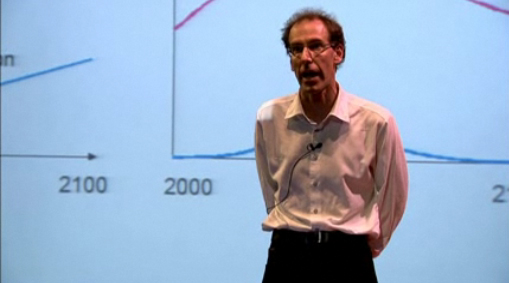David Keith’s Unusual Climate Change Idea
In the video in the link above (thanks to the fabulous TED.com), David Keith asks the question: Is geoengineering a moral hazard?
Geoengineering involves the use of technology to counteract climate change at the source or impact levels. Some ideas include iron fertilization (inject iron into the upper ocean in order to increase the rate at which plants intake CO2) and carbon capture (extract carbon from fossil fuels when they are burned and then inject it into the deep ocean). Keith’s idea, a modified version of the solar shield (inject sulfates into the atmosphere to create clouds that bounce sunlight away from the planet), mimics the natural atmosphere by moving finer particles of sulphate out of the stratosphere and higher into the mesosphere, where they would achieve much longer lifespans as compared to statospheric sulphates, which fall out very quickly. Keith could even make the particles migrate to position themselves over the poles, where they would be most beneficial in keeping the ice caps from melting.
Oh, and it’s “absurdly cheap.” You could create an ice age at the cost of only 0.001% of GDP. “We have a lot of leverage,” he says.
So what’s the problem?
Keith’s argument is that geoengineering (which is cheap, quick, and effective) leads people to believe that the gravity of the climate change situation is not as heavy as it is. Keith also fears that it will be seen as an alternative to emissions reductions, which it is not. Just as steroids are not a legitimate alternative to real body building, geoengineering will have negative side effects, namely a change in the composition of our atmosphere.
Geoengineering, as addressed in Mann & Kump’s Dire Predictions should be seen as a scheme of last resort, not a miracle dietary supplement. But it is possible for single countries or even scientists to economically change the state of the atmosphere for the entire world. Keith asks the question: if China were to need for fast change in order to prevent negative effects on global warming, what would stop them from doing so?
We are essentially playing God, and a very bigoted god at that. As geoengineering knowledge becomes increasingly widespread, we have a bunch of little gods running around the planet, altering it to be the way that they want it. This would be, of course, horrible, and would have to be governmentally controlled. But even individual governments would not be enough (because then you still have many little gods trying to keep the world right for them). We would need a global government and we’d need it fast.
And even then we risk changing the climate system completely. Keith argues that if in 2075, after climate change peaks thanks to serious emissions reductions made now, even then geoengineering may be necessary if the results of not geoengineering would be worse. Again, perspective is an issue, because we have to ask: worse for who? Does it matter who it would be worse for? It may sound a little Nietzschean, but could we sacrifice the low-lying island nations instead of risking the alteration of the atmosphere? Could the results of an altered, and therefore unpredictable atmosphere, be even worse?
We may have to begin to think like nature herself (or Charles Darwin & the Romantics) that the individual life is less important than the duration of the species, or the natural order as we know it, because if we know longer know the rules of nature’s game, we no longer know how to play.

David Keith
Read all articles by Brett Shollenberger on this blog!
Read articles by Brett Shollenberger in Dickinson Magazine!
Read Brett Shollenberger‘s blog!
Tags: Brett Shollenberger, climate change, geoengineering, morality